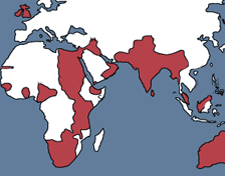“Robert has been enabled to proceed in the work of translation. He is now going on with a little work of the Rev. W. Brown, entitled ‘A Selection of Scripture Passages’; it is very tedious, but he thinks it will be very useful in the school, as well as for public reading. The scholars are making tolerable progress, and the attendance on public worship is very good. A chapel must soon be built, Mr. Hughes dwelling house being much too small. The singing goes on charmingly, and to hear many of them repeat the catechism, with copious extracts from scripture, is very gratifying. The fixed and serious attention of some of them to the preacher induces us to hope that the Spirit is at work in their hearts. We have at present a candidate for baptism, who, may prove the beginning of a Christian church among them. It is Arend, of whom you have heard formerly, a slave who ran away and sojourned many years in the interior, has some years ago purchased his own freedom with ivory, has since lived near the station, and has lately seen the necessity of a decided profession. He is an industrious pushing man, and we have reason to believe that he will be a good example, and that ere long there will be some of our poor people included also to come out and be separate. The temporal affairs of the station are very prosperous. Civilization is advancing. Nearly all our poor people have reaped good crops of wheat from their little gardens, and have now sown maize, which will have time to ripen before the first frost comes, if the locusts do not destroy them. They also grow much tobacco, which they exchange for cattle. Our own gardens are becoming beautiful. The fruit which is just ripening is very abundant; indeed, I am astonished to see what the willing earth yields in so short a time.”
Mary Moffat (1795-1871) was the wife of Robert Moffat, the missionary for the London Missionary Society who established a mission center at Kuruman in southern Africa. Their daughter married David Livingstone. In 1816, Robert Moffat was ordained and accepted as a missionary by the London Missionary Society (LMS). The previous year, while working as a gardener, Moffat had proposed to Mary Smith, the daughter of his employer. Both young people were 20. Like Robert, Mary had attended a missionary meeting earlier in her life, and she shared his interest in missionary work. Initially, her parents objected to the match because they feared they would never see her again if she went overseas as a missionary wife. For a number of years, Robert Moffat worked as an itinerant preacher in the Cape Colony. On December 27, 1819, after waiting two years for her parents to agree to the match, Moffat married Mary Smith in Cape Town. In 1820, he was appointed to evangelize among the Twsana at the Kuruman mission station. Taking his new wife with him, Moffat moved to take up his new position, arriving after a long and exhausting journey of several months. Kuruman, the most northerly LMS mission station, was situated on the edge of the Kalahari desert, so the soil was sandy and the area was frequently short of water. Although Kuruman would eventually become a major center of missionary activity, when the Moffats arrived the mission had barely begun. In order to survive, Robert Moffat needed to be a hunter, farmer, builder, and carpenter in an unstable frontier area, where struggles over land, labor, cattle, and water between competing groups were endemic. Mary Moffat struggled alongside him, raising her growing family. On December 18, 1828, pregnant with her fourth child and feeling unwell and fearful that she might die in childbirth, Mary wrote to a friend (Mrs. Wrigley) expressing her concern that she would leave “a beloved partner with 3 or 4 small children in the midst of barbarians without a civilized female . . .to keep up a civilized establishment in the midst of barbarians is attended with much care and labour on our parts.” Like other missionary wives, Mary Moffat was expected to create a domestic space, in keeping with evangelical values of domestic femininity. Robert Moffat retired from missionary service in 1870 and the couple returned to England. Mary Moffat died the following year in January.
Source: Letter from Mary Moffat to James Smith dated 30 December, 1828, in Schapera, I. Apprenticeship at Kuruman. London: Chatto and Windus, 1951. (OR, Rhodes House, Mss. Afr. t. 46.?)


